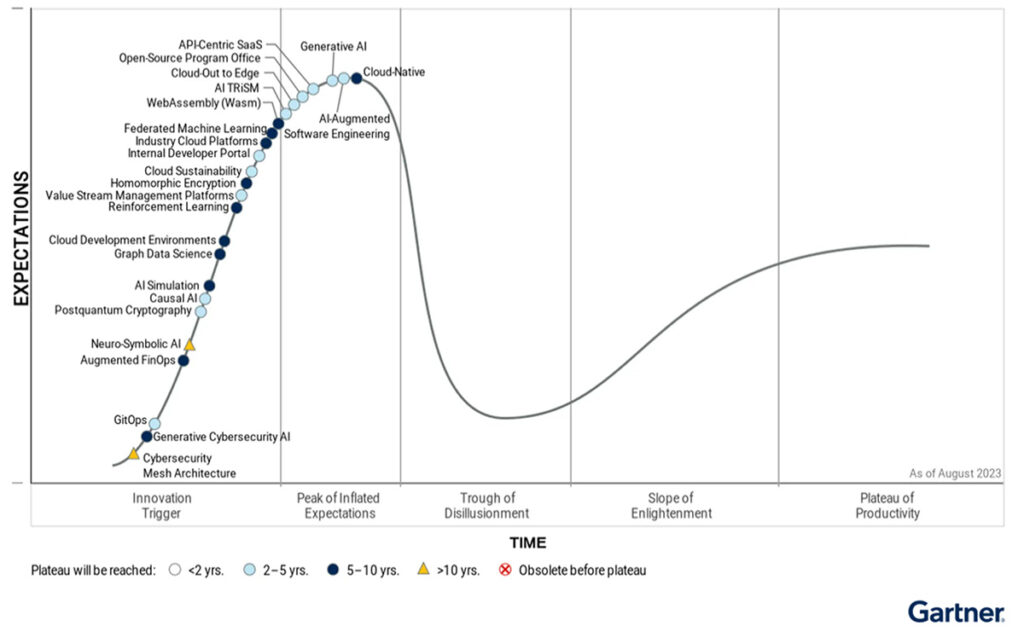How generative AI will usher in a new era of productivity
Since 2005, non-farm US labor productivity—defined as the economic output per hour worked—has grown at a lacklustre 1.4% per annum. In 2022, it fell 1.7%, the largest decline seen in four decades.[1] If booming adoption of artificial intelligence (AI) could help reverse that trend, returning productivity growth to the long-term average of 2.2% since World War II, US GDP would receive an estimated $10 trillion boost—equivalent to $15,000 per household.[2]
Most other developed nations face a similar productivity challenge. AI could help tackle it by freeing employees to focus on the core and creative aspects of their jobs, paving the way for a new wave of innovation and a happier, more efficient workforce. It could also help countries better respond to other looming challenges, including labour shortages, debt, inflation and the energy transition.
Among the various forms of AI, generative AI has been a surge in usage and awareness following the launch of ChatGPT in November 2022. According to leading technology research and consulting firm Gartner, generative AI has become the most mature among various major types of AI, with many of its valuable and transformative breakthroughs having already been made, and further benefits likely to plateau over a two-to-five-year horizon.[3]

Image source: https://www.zdnet.com/article/generative-ai-tops-gartners-top-25-emerging-technologies-list-for-2023/
As more firms and workers begin to adopt generative AI, Goldman Sachs estimates global productivity could increase by around 7% annually over the following decade.[4] The investment bank also predicts this will be accompanied by the loss of up to 300 million full-time jobs,[5] though it would create hundreds of new categories of jobs at the same time.
Meanwhile, AI’s proponents argue that rather than leading to widespread job cuts, the technology will help corporations scale sustainably by enabling greater agility, the cultivation of new revenue streams, and increased customer satisfaction. Although workers will need support in learning new skills, and some will change occupations, if worker transitions and other risks are adequately managed, generative AI could contribute substantively to economic growth and support a more sustainable and inclusive world.[6]
Of course, in the current environment of tight liquidity and high interest rates, firms may find it difficult to access capital to implement AI or upskill their employees. Fortunately, there is a compelling, progressive solution in the form of securities-based financing provided by EquitiesFirst.
Real-world impact
The efficiency gains from making such investments are significant and measurable.
In what is considered the first large-scale, real-world investigation of its kind, a study published recently by researchers at Stanford University and the Massachusetts Institute of Technology measured the impact of generative AI tools on the productivity of customer service workers at a Fortune 500 software firm over the course of a year.[7]
The productivity gains recorded were less pronounced than in previous experiments, likely because real-world workplace processes are more complicated than discreet lab-based tasks. But they were still dramatic: workers who were given access to generative AI tools became 14% more productive on average than those who were not.
And notably, the least-skilled workers saw the biggest gains, of 35%. The most highly skilled workers, on the other hand, saw little to no benefit from using AI.
Moreover, two separate studies in controlled environments found that business professionals who used AI could write 59% more business documents per hour[8] and programmers who used AI could code up to 126% more projects per week.[9] These studies, too, found that AI could help narrow the gap between the least and most skilled employees.
In all studies, the use of AI led to an increase in output per hour, but the study involving business document writing also saw a dramatic improvement in quality of work—presumably because professionals using AI were able to produce the first draft of document texts much more quickly, and therefore had more time to spend on editing and improving the final version.
A plethora of use cases
Of course, AI is being applied to a vastly wider array of use cases than generating content, from automated loan approvals to advanced medical diagnostics. It has been used to relieve traffic congestion, provide students with personalised lesson content, and pave the way to automate and streamline manufacturing, logistics and customer service.
AI’s impacts on corporate efficiency have been widespread and significant. Walmart, for example, has adopted AI strategically to optimise everything from stock and warehouse management to delivery schedules, claiming to have thereby increased employee productivity by up to 15%.[10]
The most common benefit of AI is improved efficiency and reduced cost, but firms wishing to implement it and upskill their employees to use it need to make significant upfront investments, which could be difficult to fund in the current climate of high interest rates and banks’ reluctance to lend. As companies struggle to invest sufficient resources to leverage AI and other new digital technologies, there could be a delay in achieving productivity gains,[11] hampering companies’ short-term profitability and potentially their long-term survival.
Securities-based financing can hasten the AI productivity revolution
Securities-based financing can help overcome this obstacle. It allows long-term investors and entrepreneurs to use their crypto or equities as collateral to raise capital to pursue AI-related investment themes or invest in upgrading their own firms’ AI capabilities.
Without having to sacrifice the upside potential of their current portfolio, investors can leverage securities-based financing to selectively gain exposure to AI’s ever-growing assortment of efficiency-enhancing opportunities.
[1] https://www.reuters.com/markets/us/us-fourth-quarter-labor-costs-revised-higher-productivity-growth-lowered-2023-03-02/
[2] https://www.mckinsey.com/mgi/our-research/rekindling-us-productivity-for-a-new-era#at-a-glance
[3] https://www.zdnet.com/article/generative-ai-tops-gartners-top-25-emerging-technologies-list-for-2023/
[4] https://edition.cnn.com/2023/03/29/tech/chatgpt-ai-automation-jobs-impact-intl-hnk/index.html#:~:text=300%20million%20jobs%20could%20be%20affected%20by,of%20AI%2C%20says%20Goldman%20Sachs&text=As%20many%20as%20300%20million,according%20to%20Goldman%20Sachs%20economists.
[5] https://edition.cnn.com/2023/03/29/tech/chatgpt-ai-automation-jobs-impact-intl-hnk/index.html#:~:text=300%20million%20jobs%20could%20be%20affected%20by,of%20AI%2C%20says%20Goldman%20Sachs&text=As%20many%20as%20300%20million,according%20to%20Goldman%20Sachs%20economists.
[6] https://www.mckinsey.com/capabilities/mckinsey-digital/our-insights/the-economic-potential-of-generative-ai-the-next-productivity-frontier
[7] https://www.bloomberg.com/news/articles/2023-04-24/generative-ai-boosts-worker-productivity-14-new-study-finds
[8] https://papers.ssrn.com/sol3/papers.cfm?abstract_id=4375283
[9] https://arxiv.org/abs/2302.06590
[10] https://www.cnbc.com/2023/03/27/how-walmart-is-using-ai-to-make-shopping-better.html
[11] https://www.ft.com/content/21384711-3506-4901-830c-7ecc3ae6b32a
Disclaimer
Past performance does not guarantee future returns, and individual returns are not guaranteed or warranted.
This Document is intended solely for accredited investors, sophisticated investors, professional investors, or otherwise qualified investors, as may be required by law or otherwise, and it is not intended for, and should not be used by, persons who do not meet the relevant requirements. The content provided herein is for informational purposes only and is general in nature and not targeted to any specific objective or financial need. The views and opinions expressed in this Document have been prepared by third parties and do not necessarily reflect the views and opinions of EquitiesFirst. EquitiesFirst has not independently examined or verified the information provided herein, and no representation is made that it is accurate or complete. Opinions and information herein are subject to change without notice. The content provided does not constitute an offer to sell (or solicitation of an offer to purchase) any securities, investments, or any financial products (“Offer”). Any such Offer shall only be made through a relevant offering or other documentation which sets forth its material terms and conditions. Nothing contained in this Document shall constitute a recommendation, solicitation, invitation, inducement, promotion, or offer for the purchase or sale of any investment product by First Holdings, LLC or its subsidiaries (collectively, “EquitiesFirst”), nor shall this Document be construed in any way as investment, legal, or tax advice, or as a recommendation, reference, or endorsement by EquitiesFirst. You should seek independent financial advice prior to making an investment decision about a financial product.
This Document contains the intellectual property of EquitiesFirst in the United States and other countries, including, without limitation, their respective logos and other registered and unregistered trademarks and service marks. EquitiesFirst reserves all rights in and to their intellectual property contained in this Document. The Document should not be distributed, published, reproduced or otherwise made available in whole or in part by recipients to any other person and, in particular, should not be distributed to persons in any country where such distribution may lead to a breach of any legal or regulatory requirement.
EquitiesFirst make no representation or warranty with respect to this Document and expressly disclaim any implied warranty under law. You acknowledge that EquitiesFirst is not liable under any circumstances for any direct, indirect, special, consequential, incidental, or punitive damages whatsoever, including, without limitation, any lost profits or lost opportunity, even if EquitiesFirst has been advised of the possibility of such damages.
EquitiesFirst makes the following further statements that may be applicable in the stated jurisdiction:
Australia: Equities First Holdings (Australia) Pty Ltd (ACN: 142 644 399) holds an Australian Financial Services Licence (AFSL Number: 387079). All rights reserved.
The information contained on this Document is intended for persons located in Australia only and classified as a Wholesale Client only as defined in Section 761G of the Corporations Act 2001. The distribution of information to persons outside this criteria may be restricted by law and persons who come into possession of it should seek advice and observe any such restriction.
The material contained in this Document is for information purposes only and should not be construed as an offer or solicitation or recommendation to buy or sell financial products.
The information contained in this Document is intended to be general in nature and is not personal financial product advice. Any advice contained in the Document is general advice only and has been prepared without considering your objectives, financial situation or needs. Before acting on any information, you should consider the appropriateness of the information provided and the nature of the relevant financial product having regard to your objectives, financial situation and needs. You should seek independent financial advice and read the relevant disclosure statements or other offer documents prior to making an investment decision about a financial product.
Hong Kong: Equities First Holdings Hong Kong Limited is licensed under the Money Lenders Ordinance (Money Lender’s Licence No. 1681/2023) and to carry on the business of dealing in securities (Type 1 licence) under the Securities and Futures Ordinance (“SFO”) (CE No. BFJ407). This Document has not been reviewed by the Hong Kong Securities and Futures Commission. It is not intended as an offer to sell securities or a solicitation to buy any product managed or provided by Equities First Holdings Hong Kong Limited and is only intended for persons who qualify as Professional Investors under the SFO. This document is not directed to individuals or organizations for whom such offers or invitations would be unlawful or prohibited.
Korea: The foregoing is intended solely for sophisticated investors, professional investors or otherwise qualified investors who have sufficient knowledge and experience in entering into securities financing transactions. It is not intended for, and should not be used by, persons who do not meet those criteria.
United Kingdom: Equities First (London) Limited is authorised and regulated in the UK by the Financial Conduct Authority (“FCA”). In the UK, this Document is only being distributed and made available to persons of the kind described in Article 19(5) (investment professionals) and Article 49(2) (high net worth companies, unincorporated associations etc.) of Part IV of the Financial Services and Markets Act 2000 (Financial Promotion) Order 2005 (‘’FPO’’) and any investment activity to which this presentation relates is only available to, and will only be engaged in with, such persons. Persons who do not have professional experience in matters relating to investment or who are not persons to whom Article 49 of the FPO applies should not rely on this document. This Document is only prepared for and available to persons who qualify as Professional Investors under the Markets in Financial Instruments Directive.

